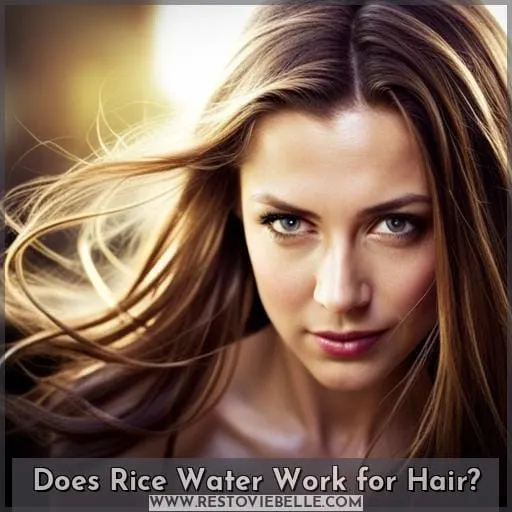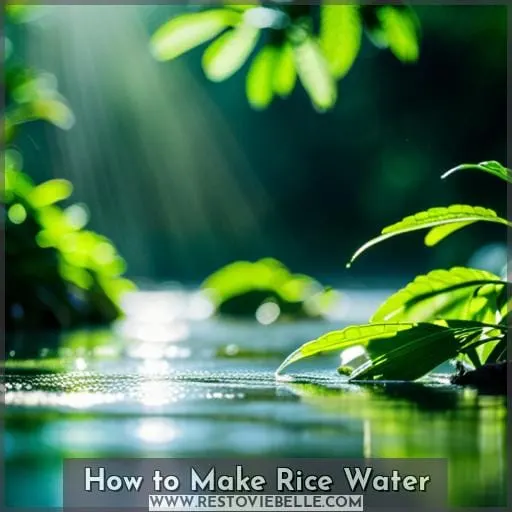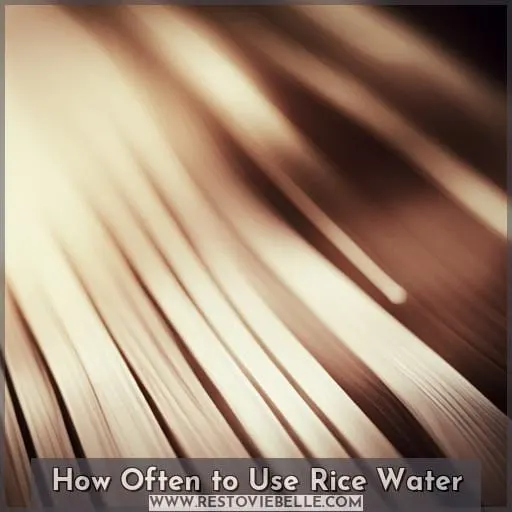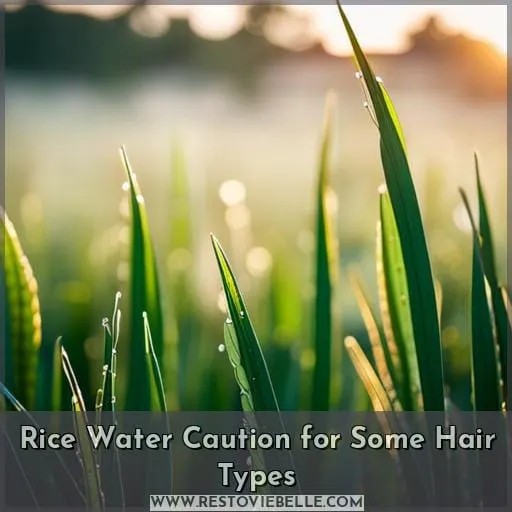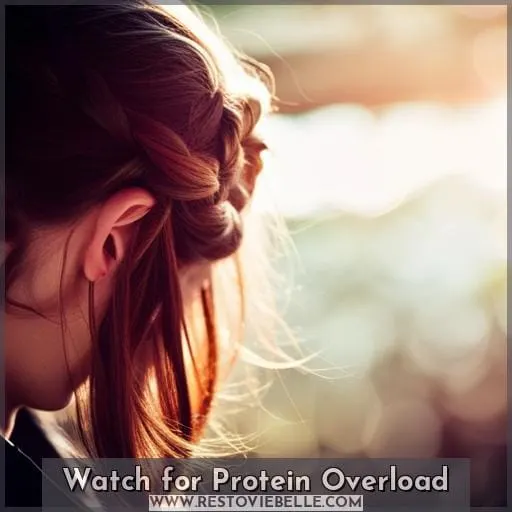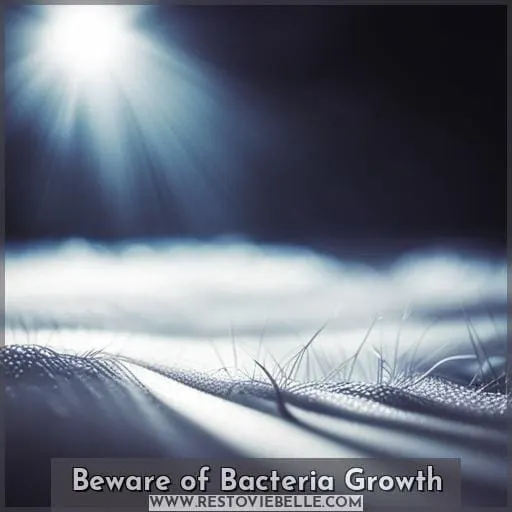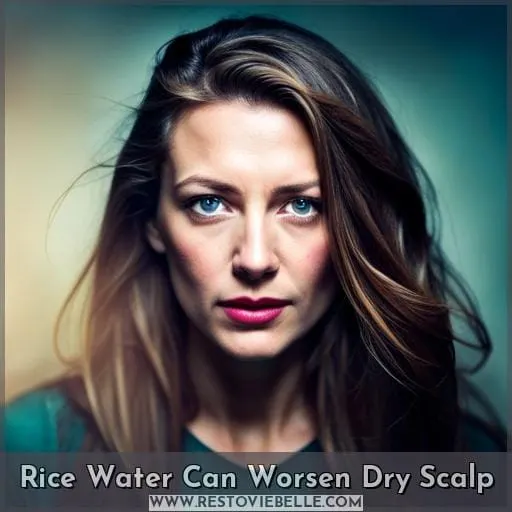This site is supported by our readers. We may earn a commission, at no cost to you, if you purchase through links.
 You’ve likely heard about the raving benefits of rice water for hair. But before jumping on the bandwagon, it’s wise to understand the potential side effects. Though rice water contains beneficial nutrients, overuse may lead to protein overload.
You’ve likely heard about the raving benefits of rice water for hair. But before jumping on the bandwagon, it’s wise to understand the potential side effects. Though rice water contains beneficial nutrients, overuse may lead to protein overload.
This results in dry, brittle strands and a strange smell. The ingredients aren’t inherently harmful, however moderation is key. Try using rice water in a diluted form at first. Pay attention to any irritation that occurs.
Then adjust the frequency and concentration as needed. With mindful use, you may just find lush locks from this ancient remedy.
Table Of Contents
- Key Takeaways
- Does Rice Water Work for Hair?
- Possible Benefits of Rice Water
- How to Make Rice Water
- How Often to Use Rice Water
- How Long to Leave in Rice Water
- Rice Water Caution for Some Hair Types
- Watch for Protein Overload
- Beware of Bacteria Growth
- Rice Water Can Worsen Dry Scalp
- When to Stop Using Rice Water
- Conclusion
Key Takeaways
- Risk of protein overload leading to brittle, straw-like hair.
- Strange smell from fermented rice water due to bacterial growth.
- Worsening of dry scalp and irritation.
- Lack of solid scientific evidence for hair growth benefits.
Does Rice Water Work for Hair?
Rice water’s appealing, but before you douse your locks, think: will this ancient elixir nourish or damage your hair? There’s no solid scientific evidence rice water grows hair. Its high protein may temporarily thicken strands, but long term the starch could lead to brittleness.
Rice water’s generally safe if used properly, but those prone to protein overload or with dry, porous hair should avoid overdoing it. For maximum shine with minimal risk, try weekly rice water rinses. But if you notice dryness or breakage, opt for gentler natural alternatives like aloe vera or coconut milk.
With thoughtful experimentation, you can harness rice water’s benefits without adverse effects.
Possible Benefits of Rice Water
You’ve likely seen rice water for hair touted for its potential to boost shine, strengthen strands, and stimulate growth. While some people report thicker, smoother hair from using rice water, more research is still needed to substantiate these anecdotal claims.
Improves Growth and Thickness
You nurture your plants with rice water, hoping they’ll grow tall and robust. But overnourishment can stunt their development.
- Strengthens hair strands and shaft
- Reduces breakage and split ends
- Boosts volume through cuticle tightening
- Improves texture and smoothness
- Shine from amino acids and minerals
Applying rice water can fortify your locks against damage. However, use it sparingly to avoid overloading your follicles, which could potentially inhibit their growth.
Enhances Shine and Smoothness
Your hair could gain incredible new luster and silkiness from rice water treatments if you limit their frequency to avoid overload. The amino acids and vitamins in rice water help polish each hair strand. Rice water’s smoothing effects can make lackluster locks start gleaming with a glossy finish.
But overdoing treatments may dry out hair and dull shine again, so stick to once or twice a week for radiant results.
Strengthens Hair and Repairs Damage
Rice water’s amino acids and vitamins are said to fortify strands and mend split ends. However, overuse risks protein overload, leaving hair brittle. Furthermore, leaving rice water on hair overnight invites bacterial growth and scalp dryness.
Try using it weekly to strengthen hair without damaging effects. Monitor protein levels and scalp health when adding rice water to your routine.
How to Make Rice Water
Oh my! Have you tried experimenting with fermenting methods when making rice water to manage the benefits and side effects for your hair? Here are some recommendations:
- Boiling rice and collecting the starchy water provides mild benefits with lower risk of side effects.
- Letting rice soak overnight extracts more nutrients but can foster bacterial growth if left too long.
- Fermenting rice water for 1-3 days creates a probiotic concentrate with maximum benefits but a higher chance of protein overload or scalp irritation.
The ideal approach is experimenting with different prep methods and applying treatments sparingly at first. Pay attention to any scalp itching or hair dryness. Consider mixing your DIY rice water with aloe vera gel or coconut milk to minimize potential irritation.
While rice water can provide some natural conditioning, more research is needed to confirm its effects.
How Often to Use Rice Water
You’ll need to experiment to find the ideal frequency for your hair type without causing protein overload or dryness.
- Once a week is a good starting point for most hair types.
- Increase to twice a week if you don’t experience dryness or brittleness.
- Decrease if hair feels straw-like or looks frizzy.
- Avoid daily use as this can lead to protein overload.
- Give hair a break if experiencing flakiness or irritation.
Applying rice water 1-2 times per week is recommended for healthy hair maintenance without overdoing it. Pay attention to how your hair looks and feels to find the ideal routine. Be patient and consistent to allow time for results before increasing application frequency.
Less can be more when it comes to rice water, so start slowly. With some trial and error, you’ll discover the ideal rice water schedule for your unique hair needs.
How Long to Leave in Rice Water
You’d best rinse out that rice water in 10-15 minutes lest your hair become brittle.
Leaving rice water on hair longer than 15 minutes can lead to protein overload, resulting in straw-like, brittle hair that’s prone to breakage.
The optimal soaking time is 10-15 minutes – any longer and you risk dryness and damage.
Overnight application isn’t recommended as bacterial growth occurs after 12 hours.
To get the benefits of rice water without the harsh side effects, limit your leave-in time.
While a rice water rinse offers many benefits, it’s crucial to rinse it out promptly to avoid unintended damage. Experiment to find the ideal timing for your hair’s needs. With careful use, rice water can give you shinier, smoother locks.
Rice Water Caution for Some Hair Types
You’ll want to avoid frequent rice water use if you have low-porosity hair or a dry scalp. Overuse can lead to protein overload, brittle hair, and further dehydration of already parched strands and irritated skin.
Those with low-porosity hair and dry scalps should use rice water sparingly to avoid potential damage. Consider alternating rice water with moisturizing treatments to nourish hair without overloading it with protein.
Pay attention to your hair’s needs and adjust your rice water usage accordingly.
Low Porosity Hair
Having low porosity hair means rice water may not penetrate the strands and could leave it dry or brittle. With low porosity hair, the cuticle layers lie flat, blocking moisture from entering. This hair type struggles to retain hydration and is more prone to protein sensitivity.
Using rice water too frequently could exacerbate dryness in low porosity strands. Experiment with rice water in small doses, and monitor hair health closely when incorporating this low-cost option.
Dry Scalp
Despite spending more, you won’t avoid an itchy condition by using rice water.
- Look for signs like dandruff, tightness, and redness after using rice water.
- Consider using aloe vera gel, coconut oil, or argan oil to provide moisturizing relief.
- Protect your scalp by doing a patch test before full use and stop if dryness occurs.
Focus on scalp health with gentler natural ingredients. Nourish hair follicles without causing irritation for optimal hair growth.
Watch for Protein Overload
Your hair’s texture and porosity determine how rice water affects it. Using rice water regularly without moderation can lead to brittle hair that has a strange smell due to protein overload.
Brittle Hair
Excessive use of rice water can make your hair brittle and difficult to moisturize. Rice water contains proteins that can overload and damage hair. Too much protein causes hair fiber breakage because hair loses elasticity and hydration.
Without proper moisture balance, hair cannot stretch and becomes brittle. To prevent breakage, use rice water in moderation, deep condition often, and avoid protein-heavy hair products. Opt for moisturizing shampoos or hair supplements instead. Be sure to drink plenty of water for hydration too.
Strange Smell
You’re wincing from the funky stench lingering in your locks after rinsing with rice water. That sour, fermented odor usually means you left the rice water sitting too long at room temperature. Scalp funk signals it’s time to rethink your prep. Stick to gentle cleansers and conditioners that balance your hair’s pH and hydrate your scalp.
That’ll keep your locks smelling fresh. Let rice water go and your strange smell woes disappear.
Beware of Bacteria Growth
Leave the rice water out too long, and it’ll start growin’ things you don’t want on your head.
- Only ferment rice water for 12-24 hours before using to prevent bacterial overgrowth.
- Store prepared batches in the fridge for up to a week or freezer for a few months.
- Never leave rice water sitting out at room temperature for more than a day – bacteria love warm, moist environments!
Overfermented rice water can throw your scalp’s moisture balance off and lead to itching or flaking. And some bacteria produce toxins that irritate skin. For best scalp health and to avoid side effects, use freshly prepared batches and don’t leave rice water sitting around too long before rinsing out.
With a little planning ahead, you can harness the benefits of rice water for your hair without unwanted bacterial hitchhikers.
Rice Water Can Worsen Dry Scalp
Doesn’t rice water leave your scalp parched if it’s already dry? Rice water can worsen dry scalp conditions like dandruff and irritation.
Signs of trouble include flaky buildup, itching, redness. To avoid problems, focus on scalp health and moisture. Before rice water, massage in oils like coconut or olive. Or dilute rice water with aloe vera gel.
Look for tingling or burning after rinsing as a sign to stop. With a gentle touch and the right mix, rice water can still benefit hair without sacrificing scalp comfort.
| Dry Scalp Concerns | Moisturizing Solutions |
|---|---|
| Flakiness | Massage in oils before |
| Itching | Dilute rice water |
| Redness | Add aloe vera gel |
| Irritation | Mix in apple cider vinegar |
| Tightness | Stop if burning or tingling |
| Dandruff | Focus on scalp moisture |
Rice water offers potential hair benefits but requires awareness of individual scalp health. Experiment cautiously and stop if dryness or irritation occurs. With care, even sensitive scalps may find rice water improves hair’s strength and shine.
When to Stop Using Rice Water
Stop using rice water on your hair if it dries into frazzled straw. Look for signs it’s worsening dryness, brittleness, split ends, frizziness, breakage or hard-to-moisturize hair. Evaluate rice water’s effectiveness for your hair type, porosity and condition. Discontinue use if adverse reactions like flaky scalp or excessive protein occur.
Assess alternatives like apple cider vinegar, aloe vera juice or commercial products. Experiment with adjusting frequency, dilution and DIY recipes. But if rice water causes more harm than good, it’s best to stop and try more hydrating ingredients better suited for your hair.
A healthy head of hair requires understanding what works for you. The goal is maintaining strength, moisture and minimizing damage – not just following trends.
Conclusion
You’re like a flower turning toward the sun when you discover rice water’s nourishing powers. Yet side effects lurk if you overdo this DIY hair therapy. Heed the cues of brittle strands and strange smells signaling protein overload.
Halt applications if you notice dry, itchy scalp. Low porosity hair becoming crunchy? Stop use and moisturize. With judicious use, rice water’s shine-enhancing, smoothing benefits can be yours. But stay vigilant, and cease use if side effects of rice water on hair appear. Your flowing locks will thank you for finding the right balance between this traditional remedy’s gifts and perils.

